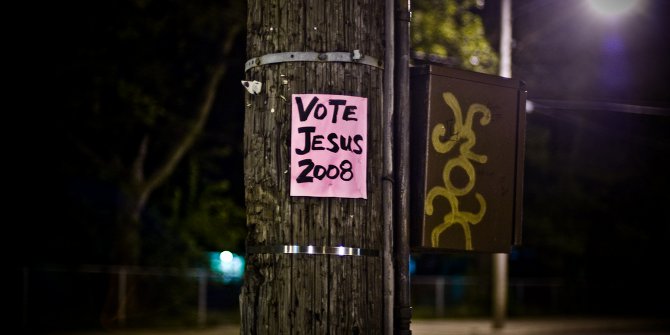
 This summer’s rulings from the US Supreme Court, including ending affirmative action in college admissions, have dismayed Democrats, who have criticised the body as undemocratic and out of step with public opinion. Julie M. Norman and Thomas Gift write that not every decision Democrats disagree with threatens American democracy, and many track closely with national polling. Calls to reform the Court, they argue, are unwarranted, and could make it harder for President Biden to govern if re-elected.
This summer’s rulings from the US Supreme Court, including ending affirmative action in college admissions, have dismayed Democrats, who have criticised the body as undemocratic and out of step with public opinion. Julie M. Norman and Thomas Gift write that not every decision Democrats disagree with threatens American democracy, and many track closely with national polling. Calls to reform the Court, they argue, are unwarranted, and could make it harder for President Biden to govern if re-elected.
After the Supreme Court’s landmark ruling in June that overturned affirmative action in college admissions, Democrats didn’t hold back in issuing their own dissenting opinions. Critics labelled the Court “un-democratic” and claimed that right-wing justices are “destroying the legitimacy of the Supreme Court.” Even President Joe Biden declared that this is “not a normal court.” Now, in the aftermath of the ruling, Democrats are increasingly mobilizing around the “crisis” that is SCOTUS.
Decisions Democrats disagree with aren’t necessarily anti-democratic
In overturning decades of precedent, the affirmative action decision was expectedly controversial. But Democrats should tread carefully. Not every decision they disagree with threatens American democracy. Lumping all non-Democrat policies under the label of un-democratic is inaccurate, unhelpful, and unwarranted.
The 6-3 ruling in the Students for Fair Admissions case is far from an extreme-right ruling; in fact, it closely tracks public opinion. Polls indicate that just a third of Americans support taking race into account in college admissions, including less than half of Black and Hispanic Americans.
The Democratic Party remains devoted to affirmative action, but Democrat voters have long been split. A case in point is progressive California, which in 2020 resoundingly rejected a state-wide ballot measure to reinstate race-conscious admissions at public universities.
Of course, Democrats’ frustration extends beyond the affirmative action decision, and many candidates are already looking to rally voters in 2024 by focusing more broadly on the Court’s conservative majority. (This is despite the fact that only five of the Court’s rulings this year fell along ideological lines, compared to 14 in 2022.)
Last year’s Dobbs decision toppling abortion rights in Roe v. Wade proved galvanizing for Democrats in the 2022 midterms, and it increased calls for institutional reforms such as packing the Court. But Dobbs is the exception, not the rule.
Why Democrats should focus on decisions, not the Supreme Court itself
Democrats’ reflexive, anti-Trump stance has rapidly escalated into an untenable position: that nearly all Republican policies jeopardize the Constitution’s lifeblood. Liberals should be wary of leaning into rhetoric that assails the legitimacy of the Court, rather than merely critiquing its jurisprudence.

“supreme court of the USA” (CC BY-SA 2.0) by Mario A. P.
First, although such calls can rally the left-wing base, they could backfire against Democrats at the ballot box. In general, moderates and independents aren’t enamored with torch-the-system solutions. Recent polls suggest that nearly 7 in 10 Americans oppose “court packing” or other structural changes that appear politically motivated.
Second, campaigning aggressively against the judicial branch could make it harder to govern, especially for a relative moderate like Biden who is already struggling with low approval ratings. The White House managed to mostly duck the issue of Court reforms earlier by punting the issue to a commission. Yet if the party embraces the rhetoric of court packing, it could put Biden in an awkward position again in 2024.
Third, bandwagoning against the Court will, as intended, amplify distrust of the judicial branch, which is already at an all-time low. But Democrats should remember that a similarly composed Court has also granted some of the biggest liberal victories in recent years, including enshrining the right of same-sex marriage in 2015. Democrats even won major unexpected victories this session on immigration, race and representation, and election laws.
Finally, Democrats should be mindful that charges of partisanship can swing the other way. The idea that only conservative jurists are partisan for voting in unison because they’re in the majority is intellectually and politically untenable. On the Court’s most momentous decisions, liberal justices also aren’t crossing ideological lines — and most Democrats wouldn’t want them to.
Democrats should focus on the real threats to democracy
Protests and criticism of the nation’s highest court are vital to American democracy, and many of the Court’s decisions, past and present, merit scrutiny and dissent. But at a moment when Democrats are justifiably lamenting the historic lack of confidence in government, they should be careful of stoking these flames further.
Such moves entrench polarization and distract from genuine threats to US institutions. Democracy held in 2020, and it likely will again in 2024 — bolstered in part by recent decisions regarding voting rights and election oversight from the very same Supreme Court that some Democrats now look to disparage.
For Democrats, there are enough real threats to US democracy heading into 2024 that merit attention without branding everything they disagree with as extreme, much less anti-democratic. It’s alluring politics, but American voters need — and deserve — more nuance.
- Please read our comments policy before commenting.
- Note: This article gives the views of the author, and not the position of USAPP – American Politics and Policy, nor the London School of Economics.
- Shortened URL for this post: https://bit.ly/44S3pWx







Hello
I’m trying to understand what’s driving the wiflds view in humanities.
I this article I understand that you’re commenting on democracy and the Supreme Court.
My question is do you view democracy as the best form of government and if so why is it so seemingly hard to use democracy to stablize the world. Meaning less conflicts etc.
Thank you.